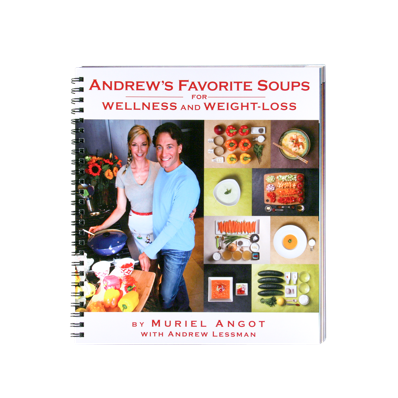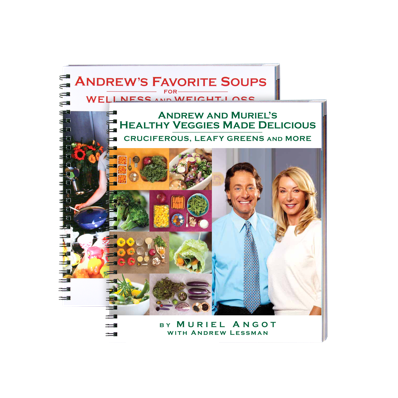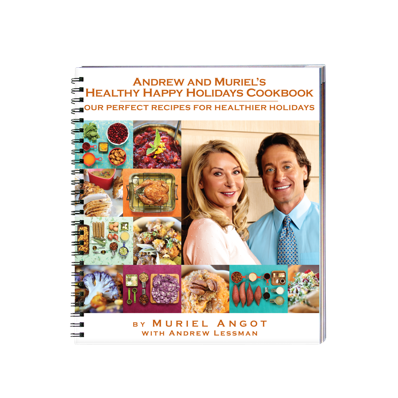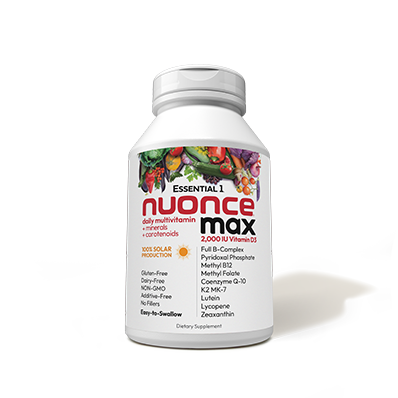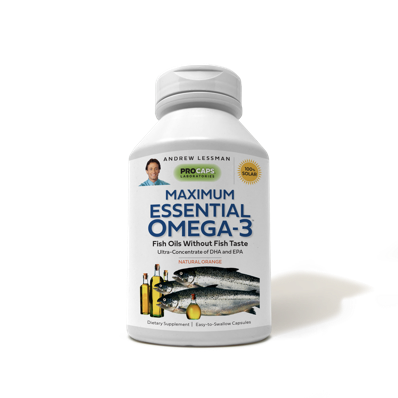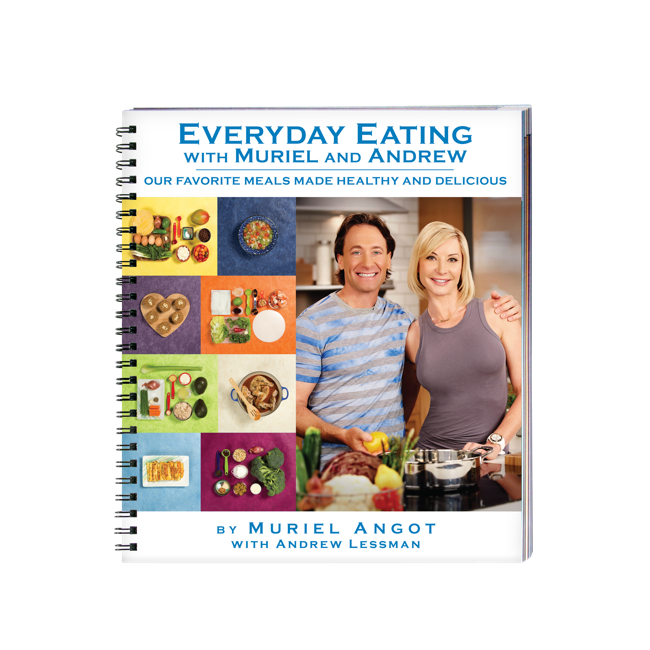
In keeping with Andrew's healthful outlook on life and wellness, Andrew and Muriel's Everyday Eating Cookbook offers a new and unique collection of natural, wholesome and delicious recipes for everyday eating, all of which have special meaning to Andrew, himself. 44 Easy-to-Follow Recipes.
Variation:
Size:
 Free shipping
Free shipping
For a limited time, we are offering Extra Special Pricing and Free S&H on many of our most popular products!
Sale prices available for a limited time only.
Free Shipping & Handling is for Standard Shipping Only (Excludes Expedited Orders).
AutoShip available.
Special pricing and free shipping available on the first shipment only.
Product Information
Almost as frequently as I hear questions about vitamins, I am asked about my diet. As many of you know, as dedicated as I am to quality nutritional supplements, I am even more passionate about the food we eat. When I was a young athlete, I ate everything in sight with complete disregard for the health or quality of what I ate. My only concerns were the food's ability to fuel my athletic endeavors (the more calories the merrier) and support muscle tissue (tons of protein). Basically, I sought calories with a complete disregard for their quality and source. Fortunately, with age comes wisdom and now I always consider the consequences of the foods I eat, thus avoiding what I have always called dangerous "provocative" foods. For me, the most provocative foods are those that are highly processed and those with ingredients with a high glycemic index and added sugars or salt. Muriel and I share these same goals, since the science is now quite clear on how to eat for optimum energy and ideal weight. Because Muriel and I eat so healthy, folks assume that our food must taste like cardboard. Nothing could be further from the truth. When friends and family eat at our home, they are always astounded that everything is so healthy, because it also tastes so delicious. Our prior books and their reviews are ample evidence that delicious food can still help you lose weight and ensure your best health. In this book, Muriel has revisited many of America's favorite foods and transformed them into healthy delicious meals. Whether it's pizza, sloppy Joes, mac and cheese, peanut butter and jelly, spaghetti and meatballs, apple pie or cheesecake. All these foods and a few dozen others are made healthy and delicious, and are easy to prepare. We have also removed most of the provocative ingredients I alluded to above. Specifically, even when called for, we add very little salt or sweetener to any recipe. We also do not use wheat or gluten nor typical pasta, rice, bread or even white potatoes or white rice. Muriel and I have both always found that the more "unhealthy" foods or ingredients we eat, the more we want. Two perfect examples are salt and sugars. The less salt you use, the less salt you want. The more salt you use, the more salt you need to satisfy the conditioned taste for salt you have acquired. Today, I add little or no salt to foods and I consume a small fraction of the salt I did previously, but my food does not taste any less salty. Of course, we all need to consume a small amount of salt, but given the abundance of salt already in the foods we eat, there is little need to ever add salt to our diet. When it is called for, you can choose to add a small amount of salt to the recipes in this book, but Muriel and I add little or none and instead prefer the use of flavorful herbs. Far worse than salt, is the presence of added sugars in the American diet. These sweet-tasting molecules are perhaps the most pernicious "addictive" ingredients in our diet. Although their manufacturers deny it, added sugars are at the very center of the epidemic of obesity in our society. For decades, I have said that today's soft drink and sugar industries are the equivalent of the tobacco industry in the 1960s. Like the tobacco industry back then, the soft drink industry and the folks behind the addition of sugars to all that we eat deny the harm their products cause. If these lies were not so deadly, they would be comic. In a few decades I expect, we will view these industries just as we did the tobacco industry. All human beings are born with a sweet tooth and these industries make us the victim of that genetically-coded potential "addiction." As Muriel and I have learned, the less we indulge our sweet tooth, the less we require. As a result, Muriel has created recipes (even desserts) that satisfy our sweet tooth while limiting the intake of sugars and high glycemic carbohydrates. Eliminating sugars and high glycemic carbs from our diet is perhaps the simplest way to lose weight - seemingly without trying. Agribusiness, along with the packaged, processed and fast food industries have us all conditioned to want more and more high glycemic carbs and sugars. It was not that long ago that a foolish fear of fat triggered an even more foolish frenzy for low fat everything. The result was even more obesity due to foods richer in high glycemic carbs and sugars. When you combine this with larger portions, you have a recipe that guarantees an epidemic of obesity. Sadly, the most powerful producers of food in our society do not consider our health when they make products that ensure obesity and disease. It does not have to be that way. If we can reclaim control of what we put in our body, then weight loss and good health are the rewards we reap. The first step to reclaiming your health and ideal weight is to rescue your taste buds from the years of conditioning from agribusiness, processed food manufacturers and fast food companies. We are the victims of these enterprises. They have hijacked and seduced our taste buds and in so doing, robbed us of our good health. There is only one way to reclaim control of our own bodies and that is by refusing the foods and ingredients they offer. In so doing, you will learn that healthy actually means delicious. Once we discover the variety of flavors found in nature, particularly vegetables, herbs and spices and how to creatively combine them, we rediscover the wonderful human palate of our ancestors. We take back control of our health and the quality of our life from those who want to sell us their wares with absolutely no regard or regret about the fact that it is killing us. I am sorry to be so direct about this issue, but unless Americans regain control of what we put in our bodies, then there is no greater threat to the quality of our life and the stability of our society than the health consequences of this epidemic of obesity. Even if you struggle with the quantity of food you put in your body, then the first step is as simple as changing the quality and nature of what you put in your body. As I always say, our best health does not begin with supplements, but with the food we choose every day to put in our body. I hope the everyday recipes in this book make it easier for you and those you love to reclaim your health from those who prefer to see you live otherwise. Bon appétit! Andrew and Muriel
For added benefits, we also recommend


For added benefits, we also recommend




Customer Reviews
By Cassidy, CA
on 3/31/2024
By Lisa, CO
on 8/8/2022
By Donna, AZ
on 1/20/2019
By Joyce, RI
on 4/14/2018



